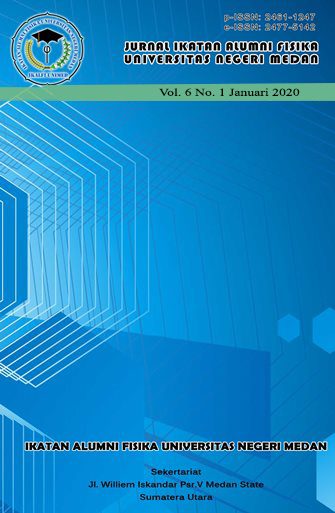EFEK MODEL PEMBELAJARAN INQUIRY TRAINING DALAM MENINGKATKAN KETERAMPILAN PROSES SAINS SISWA SMA
DOI:
https://doi.org/10.24114/jiaf.v6i1.18397Keywords:
Keterampilan Proses Sains, Model Pembelajaran Inquiry TrainingAbstract
ABSTRAKPenelitian yang berjudul œEfek Model Pembelajaran Inquiry Training dalam Meningkatkan Keterampilan Siswa SMA telah dilaksakanakan yang bertujuan untuk mengetahui efek keterampilan proses sains siswa dengan menggunakan model pembelajaran inquiry training dan dengan model pembelajaran konvensional dan untuk mengetahui karakteristik keterampilan proses sains siswa. Jenis penelitian yang digunakan yaitu quasi eksperiment. Populasi penelitian yaitu seluruh siswa kelas XI MIA SMA Negeri 18 Medan. Sampel penelitian dipilih secara cluster random sampling. Instrumen tes yang digunakan untuk mengetahui keterampilan proses sains siswa adalah soal-soal tes keterampilan proses sains berjumlah 12 soal dalam bentuk essay test. Analisa data yang digunakan adalah dengan menggunakan uji t. Hasil penelitian menunjukkan keterampilan proses sains kelas yang dibelajarkan dengan model pembelajaran inquiry training lebih baik dari kelas yang dibelajarkan dengan pembelajaran konvensional. Karakteristik keterampilan proses sains yang diasah yaitu keterampilan mengamati, merumuskan hipotesis, merancang percobaan, mengumpulkan dan mengolah data, merumuskan penjelasan dan mengidentifikasi variabel, serta menyimpulkan. Keterampilan mengamati mencapai persentasi pencapaian tertinggi.ABSTRACTThe research entitled "Effects of Inquiry Training Learning Model in Improving the Skills of High School Students" has been carried out which aims to determine the effect of students 'science process skills using the inquiry learning training model and with conventional learning models and to determine the characteristics of students' science process skills. The type of research used is quasi experiment. The study population was all students of class XI MIA Medan 18 High School. The research sample was selected by cluster random sampling. The test instrument used to find out the science process skills of students is the test questions of science process skills totaling 12 questions in the form of a test essay. Analysis of the data used is to use the t test. The results of the study show that the class science process skills learned by the training inquiry learning model are better than the classes taught by conventional learning. Characteristics of honed science process skills are observing skills, formulating hypotheses, designing experiments, collecting and processing data, formulating explanations and identifying variables, and concluding. Observation skills reach the highest percentage of achievement.References
Aminah, S. dan Delina. 2015. Efek Model Pembelajaran Inquiry Training dan Kemampuan Berpikir Logis Terhadap Keterampilan Proses Sains Siswa. Jurnal Pendidikan Fisika. 4 (2) : 63-68
BekiroÄŸlu, F., dan Arzu A. 2014. Examination of the Effect of Model-Based Inquiry on Students Outcomes : Scientific Process Skills and Conceptual Knowledge, Procedia Social and Behavioral Sciences, 141: 1187-1191
Derlina dan Afriyanti, L. 2016. Efek Penggunaan Model Pembelajaran Inquiry Training Berbantuan Media Visual dan Kreativitas Terhadap Keterampilan Proses Sains Siswa, Cakrawala Pendidikan. XXXV (2) : 153-163
Ergul, R., Simsekli, Y., Calis, S., Ozdilek, Z., Gocmencelebi, S., Sanli, M. 2011. The Effects of Inquiry-Based Science Teaching On Elementary School Student™s Science Process Skills and Science Attitudes.
Harahap, R., Sirait, M., dan Bukit, N. 2017. The Effects of Inquiry Training Learning Model Assistes Mind Map for Conceptual Knowledge and Science Prosess Skill. Journal of Research & Method in Education. 7 (5) : 26-31
Hifni, M., dan Turnip, B. M. 2015. Efek Model Pembelajaran Inquiry Training Menggunakan Macro Media Flash Terhadap Keterampilan Proses Sains dan Kemampuan Berpikir Logis. Jurnal Pendidikan Fisika. 4 (1) : 9-16
Hutahean, R., Harahap, M. B., dan Derlina. 2017. The Effect of Scientific Inquiry Learning Model Using Macromedia Flash on Students Concept Understanding and Science Process Skill in Senior High School. . Journal of Research & Method in Education. 7 (4) : 29-37
Joyce, B., Marsha, W., dan Emily C. 2009. Model-Model Pengajaran Edisi Kedelapan (Achmad F & Ateilla M, Penerjemah). Yogyakarta : Pustaka Pelajar
Sagala, Syaiful. 2008. Konsep dan Makna Pembelajaran. Bandung : Alfabeta
Sihaloho, H. W., Sahyar, dan Simanjuntak, M. P. 2018. Pengaruh Model Pembelajran Inquiry Training Terhadap Keterampilan Proses Sains Siswa. Jurnal Pendidikan Fisika. 7 (2) : 91-97
Silitonga, P, Harahap, M B, dan Derlina. 2016. Pengaruh Model Pembelajaran Inquiry Training dan Kreativitas Terhadap Keterampilan Proses Sains. Jurnal Pendidikan Fisika. 5 (1) : 44-50
Simsek, P, dan Kabapinar. 2010. The Effect of Inquiry-Based Learning on Elementary Student™s Conceptual Understanding of Matter, Scientific Proses Skill and Sciende Attitudes. Procedia Social and Behavioral Sciences. 2 : 1190-1194
Downloads
Published
Issue
Section
License
Copyright (c) 2020 JURNAL IKATAN ALUMNI FISIKA UNIVERSITAS NEGERI MEDAN

This work is licensed under a Creative Commons Attribution 4.0 International License.
Authors who publish with this journal agree to the following terms:- Authors retain copyright and grant the journal right of first publication with the work simultaneously licensed under a Creative Commons Attribution License that allows others to share the work with an acknowledgement of the work's authorship and initial publication in this journal.
- Authors are able to enter into separate, additional contractual arrangements for the non-exclusive distribution of the journal's published version of the work (e.g., post it to an institutional repository or publish it in a book), with an acknowledgement of its initial publication in this journal.
- Authors are permitted and encouraged to post their work online (e.g., in institutional repositories or on their website) prior to and during the submission process, as it can lead to productive exchanges, as well as earlier and greater citation of published work (See The Effect of Open Access).

